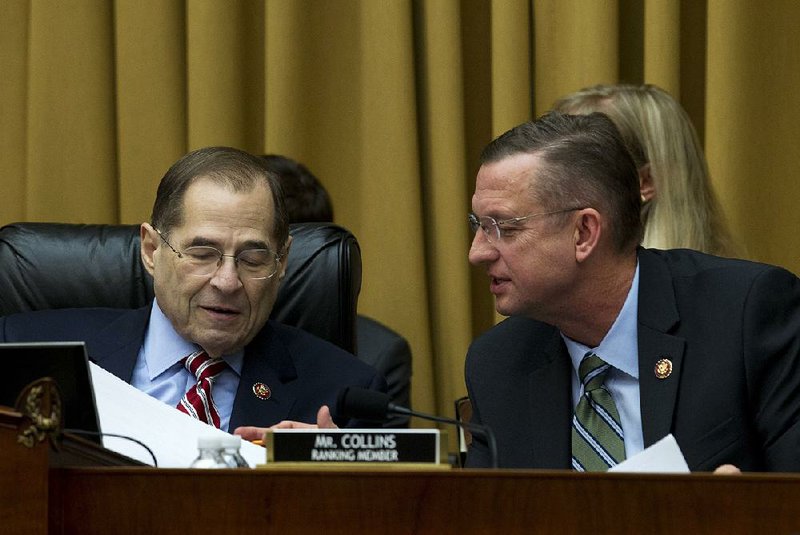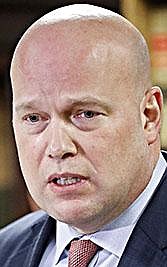WASHINGTON -- The Justice Department said Thursday that Acting Attorney General Matthew Whitaker will testify before the House Judiciary Committee today as scheduled, ending a day's worth of uncertainty over whether he would appear.
Whitaker's appearance became questionable Thursday after the panel, led by Democratic Rep. Jerrold Nadler of New York, approved a tentative subpoena to ensure that Whitaker would appear and answer questions. Whitaker responded by saying he wouldn't appear unless the committee dropped its subpoena threat, which he derided as an act of "political theater." After conversations with the committee, a department spokesman said, Nadler agreed that the committee would not issue a subpoena if Whitaker voluntarily appears at the hearing.
"In light of that commitment, Acting Attorney General Whitaker looks forward to voluntarily appearing at tomorrow's hearing and discussing the great work of the Department of Justice," said spokesman Kerri Kupec.
Nadler did not detail his discussions with the department but tweeted Thursday evening: "CONFIRMED: Acting Attorney General Whitaker will appear tomorrow morning at 9:30am."
Whitaker's testimony has been highly anticipated by Democrats eager to press him on his interactions with President Donald Trump and his oversight of special counsel Robert Mueller's investigation into potential ties between Russia and the Trump campaign.
The vote by the committee didn't issue a subpoena but allowed Nadler to do so if Whitaker was uncooperative. Nadler said that as late as last week the committee had received reports that some at the department were counseling Whitaker not to appear.
Whitaker insisted Thursday that that was not the case and criticized the committee for authorizing a subpoena.
"I remain willing to appear to testify tomorrow, provided that the chairman assures me that the committee will not issue a subpoena today or tomorrow, and that the committee will engage in good faith negotiations before taking such a step down the road," Whitaker said Thursday in a statement.
He said the committee has "deviated from historic practice and protocol and taken the unnecessary and premature step of authorizing a subpoena to me, the acting attorney general, even though I had agreed to voluntarily appear." He said that move is a breach of his agreement with the panel.
Whitaker's position was relayed in a letter sent Thursday to the committee.
"Respectfully, this proposed approach reflects a striking departure from the constitutionally based understanding between our co-equal branches of government," wrote Stephen Boyd, head of the Justice Department's office of legislative affairs.
The panel vote on the subpoena along partisan lines underscores the new political tensions around Mueller's work now that Democrats control the House.
"I hope not to have to use the subpoena," Nadler said earlier Thursday. "Unfortunately, a series of troubling events over the past few months suggest that we should be prepared."
Daniel Schwarz, Nadler's spokesman, said, "That's what we've been talking about this whole time." He stressed that the panel had sent Whitaker many letters and requests to settle points of his testimony in advance, to which he had chosen not to respond. "You can't pretend there's been no conversations for the last month."
Democrats worry that Whitaker, whose public comments before taking over the Justice Department suggested that he was sympathetic to Trump and critical of the Mueller inquiry, may seek to evade questions he is asked during the proceedings.
They pointed to a pattern of administration witnesses, such as former Attorney General Jeff Sessions, who refused to answer certain queries by suggesting that the president "might" want to invoke executive privilege over certain parts of their testimony, to justify the concern.
"The committee can and should expect a direct answer to any question," said Nadler, who opted to send Whitaker his questions in advance and require that he tell the panel about any plans to invoke executive privilege at least 48 hours before the hearing. "That deadline has come and gone ... therefore I expect the acting attorney general to answer all of these questions without equivocation."
In his letter, Boyd laid out an argument for asserting such executive privilege, saying that administration officials from both parties have declined to answer questions about conversations they have had with the president.
"Rather than conducting appropriate oversight into the department's programs and activities, the committee evidently seeks to ask questions about confidential presidential communications that no attorney general could ever be expected to disclose under the circumstances," Boyd wrote.
Nadler said invoking executive privilege is "ridiculous" and administration officials must provide the committee with answers or a better excuse to withhold them.
"Without the threat of a subpoena, I believe it may be difficult to hold Mr. Whitaker to this standard," Nadler said.
But Republicans objected to the move, arguing that Whitaker had not given the panel a legitimate reason to be concerned -- and that approving a pre-emptive subpoena would set a bad precedent for the panel.
"This subpoena is nothing short of political theater," said Rep. Douglas Collins of Georgia, the panel's ranking Republican. "I'm concerned about the chilling effect on other witnesses who would be willing to testify voluntarily, and when they see this happen, they'll just hold out."
After Whitaker made his intentions clear, Collins said that Nadler and the Democrats had "overplayed their hand" with the goal of scoring "political points" against the president. "They authorized a pre-emptive subpoena, treating a voluntary witness as hostile," he said.
Republicans had attempted to get the committee to expand the subpoena-in-reserve to give Nadler the authority to subpoena Deputy Attorney General Rod Rosenstein, whom GOP members of the panel have long wanted to question about reports that he suggested recording the president and invoking constitutional procedures to remove him from office.
If the panel had questions about oversight of Mueller's probe, Republicans also argued, it would be better to question Rosenstein, who had been monitoring it for far longer than Whitaker.
"We want to add Mr. Rosenstein to get at the heart of the matter of the questions," said Rep. Andy Biggs, R-Ariz., who presented the amendment to add Rosenstein's name to the subpoena authorization. "He could probably answer those questions more thoroughly than anybody else."
The panel voted against the proposal, also along party lines.
Whitaker's hearing probably will be one of his final appearances as acting attorney general. The Senate Judiciary Committee voted along party lines Thursday to advance the nomination of William Barr to serve as attorney general, and the full Senate is expected to vote on confirmation next week. He is expected to be confirmed, as he needs to secure a simple majority of the GOP-led Senate for his nomination to be approved.
Information for this article was contributed by Karoun Demirjian and Devlin Barrett of The Washington Post; and by Mary Clare Jalonick and Eric Tucker of The Associated Press.
A Section on 02/08/2019

